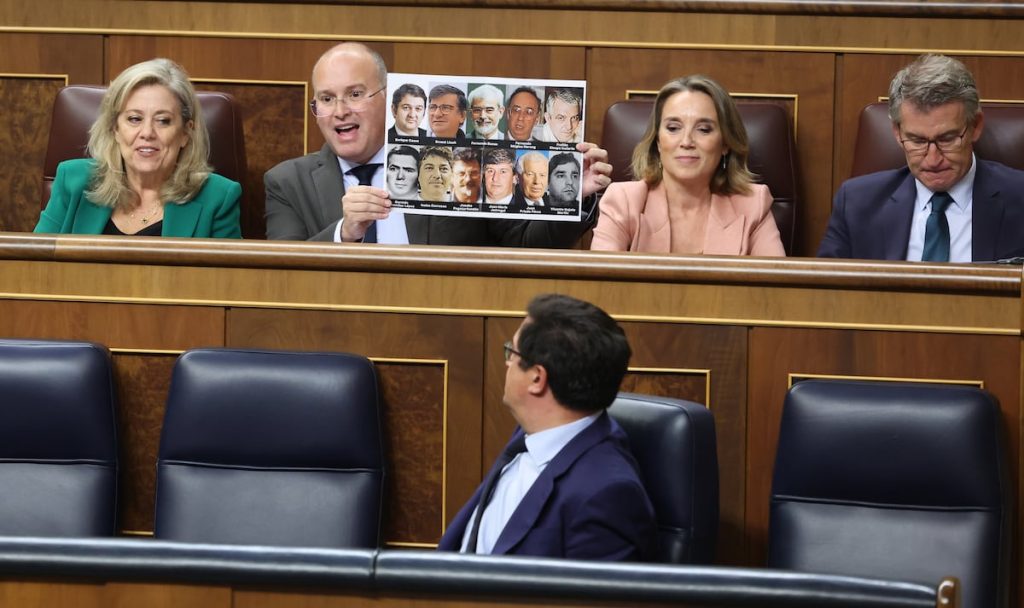ETA has dominated the parliamentary debate on Wednesday in the Spanish Congress of Deputies. This was evident in the appearance requested by the PP of the President of the Government, Pedro Sanchez, to discuss immigration and fiscal balance, as well as in the subsequent control session. The PP spokesman, Miguel Tellado, came prepared with a poster featuring photographs of Socialist officials assassinated by the terrorist group ETA, directing his remarks at the First Vice President and Minister of Finance, María Jesús Montero. He questioned whether it was really worth changing six votes in exchange for the dignity of the victims of terrorism in Spain, asking if she was truly willing to look the families of these officials in the eyes and explain that six votes for the budget were worth it. María Jauregi, daughter of the former Socialist civil governor in Gipuzkoa Juan María Jáuregui, who was assassinated by ETA in 2000 and featured in Tellado’s poster, responded via social media, challenging Tellado to not use her father’s image as a weapon and to respect his memory.
Victims of ETA interviewed by EL PAÍS expressed their rejection of both the legal modification that will allow ETA prisoners to serve a maximum of 30 years in prison in total for their crimes by subtracting the time already served in France, as well as the subsequent reaction from opposition parties. Both the PP and Vox supported the amendment that will allow this legal change but claim it was an “error,” stating that they did not read what they were signing, despite the Justice Commission’s minutes explicitly stating that they had “studied it carefully.” Consuelo Ordóñez, president of the Collective of Victims of Terrorism (Covite), accuses the Government of “lying” when they claim that this legal modification was necessary, as no court had mandated changing the law, even though it prevented compliance with the European directive. Ordóñez criticizes what she believes increases the impunity for terrorist crimes and also condemns the subsequent reactions from the PP and Vox. She laments that both parties do not care about the victims, citing instances where the victims have been used for political gain. Maite Araluce, president of the Association of Victims of Terrorism (AVT), shared that they had contacted the leaders of the PP and Vox after learning about the legal change and received apologies, with both parties expressing embarrassment and vowing to try to rectify the situation.
Araluce also noted that the use of victims in political discourse is distasteful, but she prefers that they continue to be discussed rather than be ignored by the government. She shared that the Association has received numerous calls from victims concerned about the possible release of their loved ones’ killers due to the legal change. The president of AVT also recalled that the Ministry of the Interior had assured them in February 2022 that there were no initiatives to modify regulations related to the juridical effects of criminal convictions in other EU countries, but two years later, the government enacted such changes without explanation. The victims feel used by the political parties and express a sense of dismay at the lack of consideration for the victims’ families. The conflict between the parties regarding the handling of cases related to ETA’s crimes has sparked controversy and increased attention to the ongoing societal struggle to reconcile different memories and interpretations of history in Spain.
The instrumentalization of victims by political parties for their own agendas has been condemned by both ETA victims and their families as morally reprehensible. The renewed focus on the victims and their stories due to recent political events has brought to light the ongoing pain and trauma experienced by those affected by terrorism in Spain. The public scrutiny of the government’s actions and the legal changes related to terrorist prisoners have intensified the debate on memory, justice, and reconciliation in the context of Spain’s history of terrorism. The emotional toll on the victims and their families has been significant, as they grapple with the consequences of political decisions and the continued need for remembrance and honor for those who lost their lives to terrorism.


